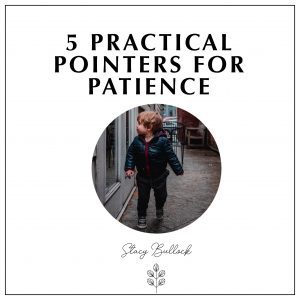5 Practical Pointers for Patience
posted in: Uncategorized
0
I think it goes without saying that all parents want their children to learn patience. Most parents don’t need a lecture about developing this virtue in their kids. We already know it’s important. What is hard, however, is actually getting this virtue into the hearts of our children and, if we’re honest, into our own hearts as well.
Let’s look at the goal of patience and then work backwards, breaking it down, as I share some practical ways I’ve taught this very important virtue to my young children.
- The end goal of patience: As parents, we can set the example for our children as they see our hope:
Be patient therefore, brethren, unto the coming of the Lord. Behold, the husbandman waiteth for the precious fruit of the earth, and hath long patience for it, until he receive the early and latter rain. Be ye also patient; stablish your hearts: for the coming of the Lord draweth nigh.
James 5:7-8
We need to have more of this rhetoric in our homes. Our end goal on this earth is not success in a career, numerous material possessions, or a high social status. Our goal is to bring Jesus as much glory as we possibly can, putting many jewels in those crowns we will receive to be cast at His feet. Oh, what a glorious joy that cannot be comprehended! Have this in your mind each time you’re losing patience with your children, when they’re misbehaving, when your spouse isn’t understanding, or when no one is helping around the house. Remember, it’s only an opportunity to put a jewel in that crown and make it more beautiful for Jesus. Remind your children of this too, especially the older ones who are saved. Remind them with joyfulness in your eyes and hope in your tone. Show them through your own display of patience. So much more is caught than taught. Be patient for that fruit, and do the work as the gardener does. He doesn’t talk to his plants to help them grow, he does the work. He waits for the rain and the sun. Let your children see your diligence and patience and you will eventually see the fruit.
- The testimony of an excellent spirit: So where do we start practically with our children? This verse maps it out nicely:
And not only so, but we glory in tribulations also: knowing that tribulation worketh patience; And patience, experience; and experience, hope:
Romans 5:3-4
Start with the daily trials of life. Keep in mind that each little hardship your child goes through is an opportunity allowed by the Father to work on patience. Through your diligent coaching in these problems, your child can view the experience as something that produces wisdom. If they gain wisdom through your example and coaching, they will gain hope which produces an excellent spirit, which, in turn, produces a good testimony for Christ.
- Self-control and patience: We can begin teaching self-control to our toddlers as young as 18-24 months old. This begins with teaching “quiet hands”. Quiet hands is not a punishment. It’s a tool the parent can use when you are getting a sense that the child is heading down a road of losing control (whether in an excited way, a frustrated way, an angry way, or a sad way.) We don’t want to suppress our child’s feelings, but we want them to learn how to control their feelings, to face them, and make a choice. Often I will ask my 3- and 4-year-olds, “Do you want to decide how you act or do you want your feelings to pick?” They always say, “I want to pick” because it helps them think outside of their natural selfishness. This is the beginning of patience.
- Training during periods of no conflict: Training in times of non-conflict is not only highly effective but it can also be very fun. Here’s a great game idea you can do with kids of all ages to strengthen family identity, team-building skills, and patience for one another: We call it “EMERGENCY.” Some of your kids are assigned an ailment (blindness, broken leg, etc) and the other family members have to get them through the house to another room. This encourages communication, service, patience, and being others-centered.
- Note: in performing this exercise, be sure to use it as an opportunity to teach empathy. This is not an opportunity to make fun of a disabled person, but rather to experience the world in a new way.
Another tool you can utilize in everyday situations that encourages patience is the interrupt courtesy. If you or another adult is talking, the child should put his hand on you so that you know he’s there. He then waits until he’s given your attention. Small children don’t understand the social skills it takes to consider others, so this is a practical way they can begin to learn patience and putting others first. (Of course they should know that emergencies are always an exception to the rule.) Because small children don’t yet understand this, one way to begin teaching it to them is to consider them.
Remember the purpose of these tools is to bring about genuine fruit that stems from the love of the virtue of patience. If these are taught from a spirit of frustration from the parent, the child will comply but from a fear of reproof, not a love of virtue. Let them see your fruit, and in time they will desire to bear the same fruit.
But the fruit of the Spirit is love, joy, peace, longsuffering, gentleness, goodness, faith, meekness, temperance: against such there is no law. Galatians 5:22–23
Stacy Bullock is a wife and stay-at-home mother of four kids. Married to her high school sweetheart, Joshua, she couldn’t imagine a more fulfilling life. She enjoys playing the cello, horseback riding, and helping other mothers find fulfillment in making their quiver a happy and heavenly home to sharpen and ready their arrows (children) to be launched into the world to glorify God in following His calling on their lives.




